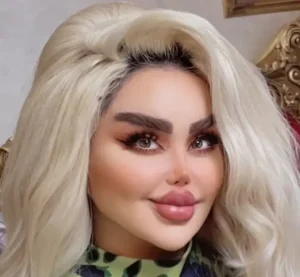At 29, Iraqi actress and TV host Dalia Naeem has rewritten the rules of cosmetic transformation—not with subtle tweaks, but with 43 documented procedures to embody her vision of a “real-life Barbie.” Her journey, documented across social media, has ignited a firestorm: adored by nearly 1 million followers as “Iraqi Barbie,” yet condemned by critics as a “Zombie” or “Devil Barbie.” This isn’t just about aesthetics—it’s a cultural flashpoint exposing society’s deepest tensions around beauty, identity, and the price of perfection.
🔬 The Anatomy of a 43-Procedure Transformation
Dalia’s metamorphosis spans five years of surgical precision, with costs totaling tens of thousands of dollars. Key interventions include:
- Lip augmentation (multiple filler sessions)
- Rhinoplasty (reducing nasal bridge to “doll-like” proportions)
- Breast enlargement (creating exaggerated curvature)
- Facial contouring (jawline reshaping, cheek implants)
- Hair transformation (bleached golden locks, signature to her Barbie persona)

In a viral video, her makeup artist gushed, “You look so beautiful, my dear. Like Barbie.” Dalia replied, pointing to her glittering eye makeup: “Your makeup is Barbie.” This exchange crystallizes her philosophy: Barbie isn’t a toy—it’s a lifestyle.
⚖️ Two Worlds Collide: Adoration vs. Abhorrence
The “Iraqi Barbie” Phenomenon
- 996,000 Instagram followers and 43,900 TikTok fans celebrate her as a beauty revolutionary.
- Fans flood comments with “Barbie goals!” and “She redefined Middle Eastern beauty.”
- Iraqi media highlights her as a trailblazing actress who leveraged fame into a modeling career.
The “Zombie” Backlash
- Critics flood platforms with terms like “Devil Barbie” and “plastic zombie,” citing:
- Frozen facial expressions (from excessive fillers)
- Disproportionate features (e.g., lips swallowing her nose)
- Loss of ethnic identity (erasing traditional Iraqi beauty markers)
- A viral meme juxtaposed her current look with a horror movie still—captioned: “When Barbie meets The Walking Dead.”
💡 The Core Conflict: “Is she empowering women or erasing cultural identity?” dominates Middle Eastern feminist forums.
🌍 Why This Matters Beyond the Mirror
Dalia’s story transcends personal choice—it’s a cultural Rorschach test:
|
Beauty Liberation
|
“She owns her body—Barbie is her armor against sexism.”
|
She’s succeeded in male-dominated Iraqi mediadespitecontroversy.
|
|
Cultural Erasure
|
“Barbie = Western ideal. She’s rejecting Iraqi heritage.”
|
Pre-surgery photos show natural features aligned with regional beauty norms.
|
|
Medical Ethics
|
“43 procedures risk nerve damage, chronic pain, or addiction.”
|
No public health reports—but experts warn of “body dysmorphia escalation.”
|
The unspoken truth: Her critics rarely attack men who undergo similar procedures. As Baghdad psychologist Dr. Layla Hassan notes:
“Society calls male celebrities ‘refined’ for rhinoplasty. For women? ‘Zombie.’ This isn’t about safety—it’s about controlling female ambition.”
📸 Before vs. After: The Visual Divide
- Pre-Transformation (2019):
Natural nose, modest lips, dark hair—resembling classic Iraqi actresses like Hind Rustum. - Post-43 Procedures (2024):
Ultra-pale skin, needle-thin brows, lips 3x original size, and surgically narrowed jawline.

The irony: Her most-liked post features her without makeup—yet critics still call it “uncanny valley.”
💬 Dalia’s Unapologetic Manifesto
Despite vitriol, she posts daily—reclaiming the narrative:
“They say ‘Zombie’ because I chose my beauty, not theirs. Barbie isn’t plastic—she’s fearless. If my journey helps one girl love herself? Worth every needle.”
She leverages fame strategically:
- Partners with Iraqi women’s charities (using platform for advocacy)
- Stars in Emirati TV dramas (proving marketability beyond looks)
- Ignores hate accounts—deleting only abusive DMs
🌟 The Bigger Picture: When Beauty Becomes a Battleground
Dalia’s story mirrors global tensions:
- In South Korea, 1 in 3 women get surgery—but “Barbie” aesthetics are rarely celebrated.
- In Brazil, extreme procedures are normalized—but never tied to Western icons.
- In the Arab world, she’s both pioneer and cautionary tale.
The verdict isn’t hers to carry:
“We judge her for 43 procedures but ignore the 43 societal pressures that drove her there.”
— Dr. Nadia Al-Sayed, Cultural Anthropologist, American University of Beirut
✨ Final Thought: Beyond the “Zombie” Label
This isn’t about whether Dalia “looks like Barbie.”
It’s about who gets to define beauty in a world that:
- Brands natural Black features “unprofessional”
- Pays actresses less for “ethnic” noses
- Profits from women’s insecurity via $500B beauty industry
So tomorrow:
✅ Question why “Zombie” sticks to her—but not to male celebrities with similar procedures.
✅ Celebrate her success as an actress—not just a body.
✅ Demand ethical standards for cosmetic tourism in the Middle East.
Because the most radical act isn’t 43 procedures—it’s refusing to apologize for existing on your own terms.






